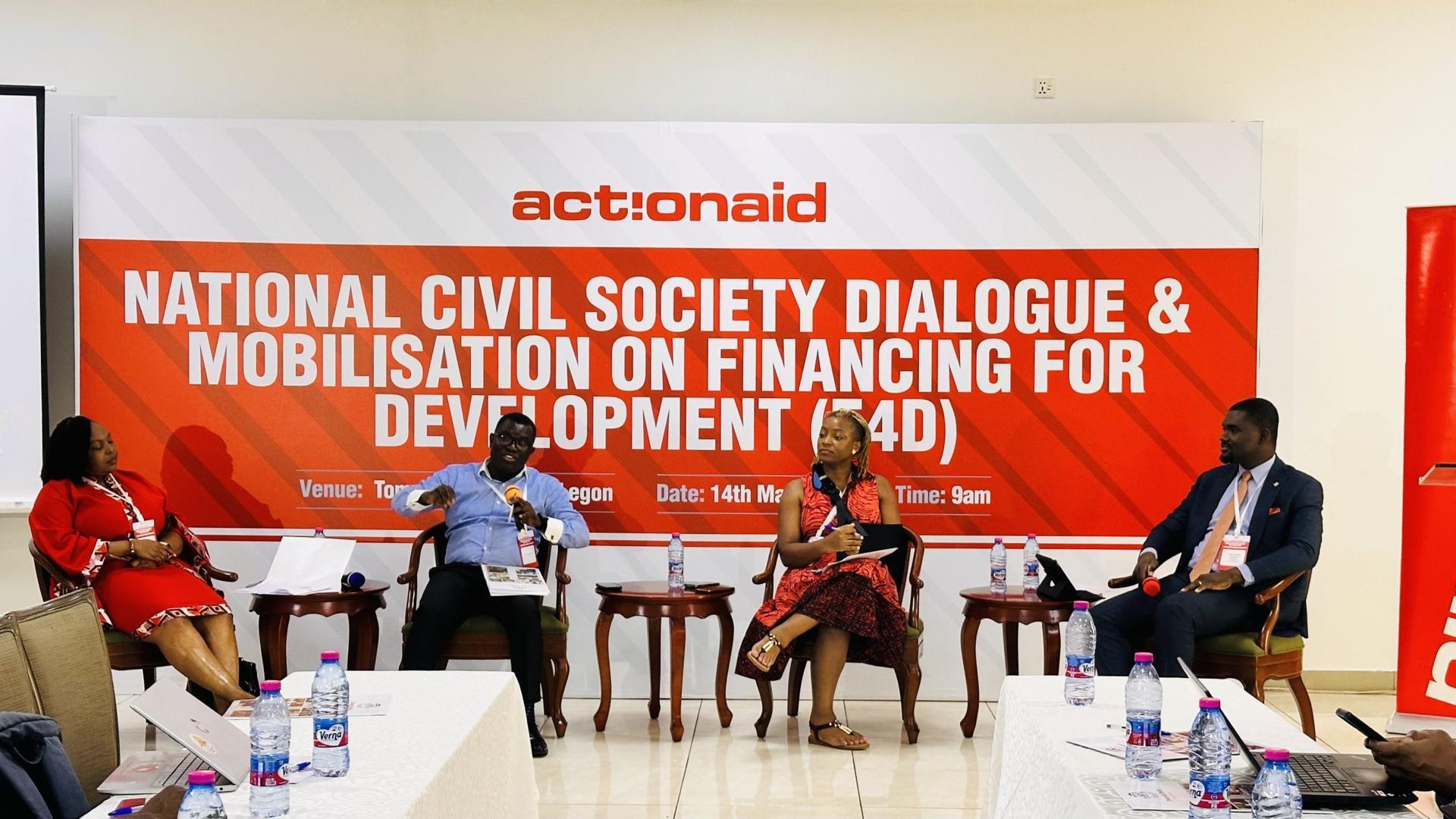Africa-Press – Ghana. A coalition of Civil Society Organisations (CSOs), development partners, and youth-led movements is demanding urgent fiscal reforms and a paradigm shift in Ghana’s financing for development strategy.
The demand comes amid concerns over rising debt levels, inequality, and dwindling international aid.
The organisations are calling on government to adopt progressive taxation measures that ensure the wealthy and multinational corporations contribute their fair share while safeguarding the interests of vulnerable populations.
They are also urging stronger enforcement against illicit financial flows, investment in public services, and a shift toward climate-resilient and gender-responsive budgeting.
Specifically, the CSOs want government and development partners to implement systemic reforms to repatriate stolen wealth, eliminate tax avoidance mechanisms, and reinvest in social infrastructure including health, education, water, and sanitation.
They argued that public financing decisions must centre on equity, justice, and long-term sustainability, particularly in light of the harsh economic realities faced by ordinary Ghanaians.
These demands were made at the National Civil Society Dialogue on Financing for Development (F4D) held in Accra.
The forum, organised by ActionAid Ghana, brought together a wide array of stakeholders including OXFAM, CARE, Plan International, ISODEC, ABANTU for Development, NETRIGHT, Ghana Integrity Initiative (GII), Amnesty
International Ghana, the West Africa Civil Society Institute (WACSI), Catholic Relief Services (CRS), Tax Justice Networks, and various youth-led groups.
Mr John Nkaw, Country Director of ActionAid Ghana, said the economic crisis Ghana currently faced was not accidental but structural and rooted in a global system that privileged the wealthy at the expense of developing nations.
He noted that Ghana’s economic situation mirrored global trends, with the country’s public debt reaching over GH¢608 billion by the close of 2023.
He explained that this figure went beyond just economic pressure as it symbolized halted development projects, shortages in essential public services, and the growing number of young people left without opportunities.
Mr Nkaw stated that in 2024 alone, low-and middle-income countries spent a combined US$138 billion servicing debt – resources he argued could have significantly improved the living conditions of millions if redirected toward development.
He described Ghana’s situation as “a crisis engineered by a global economic order” and noted that foreign aid, such as USAID support, had dropped by as much as 90 per cent.
The ActionAid Ghana Country Director urged CSOs to “move from rhetoric to resistance, from conversation to coordinated action,” stressing that the country’s economic future could not be left to market forces alone.
“This must be the launch of a sustained movement, one that challenges injustice and reclaims our economic sovereignty,” he added.
Mr Bernard Anaba, Policy and Programmes Lead at ISODEC, who provided a technical perspective on Ghana’s debt trajectory, explained that the current model of rolling over debt and increasing reliance on private capital markets was unsustainable.
He pointed to widespread tax evasion, capital flight, and privatisation of strategic sectors as key reasons why government revenue had dwindled.
“Multinational corporations and private equity funds are controlling key parts of our economy while illicit financial flows continue to drain resources that could fund development,” he said.
He recommended comprehensive tax reforms, formalisation of the informal economy, tightening laws on capital transfers, and coordinated international advocacy for debt cancellation as essential steps toward restoring fiscal stability.
The dialogue featured a panel discussion on alternative financing solutions for Ghana, with presentations by Ms Genevieve Partington, Country Director of Amnesty International Ghana; Ms Nana Asantewa Afadzinu, Executive Director of WACSI among others.
Ms Partington underscored the importance of leveraging innovative domestic financing mechanisms, particularly taxation and crowdfunding, to support national development.
She stressed that a fair and progressive tax system was crucial for ensuring that those with higher income and wealth contributed proportionately more to the public purse.
According to her, this approach not only helped reduce inequality but also built a more just and equitable society where the burden of financing development did not fall disproportionately on the poor.
Ms Partington also highlighted the growing potential of crowdfunding as an alternative financing tool, especially for social initiatives, explaining that crowdfunding could democratise resource mobilisation by allowing citizens, particularly the youth and civil society actors, to contribute directly to causes they cared about.
The Amnesty International Ghana Country Director noted that when properly harnessed that model could complement traditional financing and empower communities to take ownership of development projects.
Mrs Nana Asantewa Afadzinu, Executive Director of the West Africa Civil Society Institute (WACSI), advocated for the establishment of a dedicated “Ghana Fund or Ghana Aid” as a strategic response to the country’s development financing challenges.
She argued that such a fund, owned and managed by Ghanaians, would serve as a reliable and sustainable pool of resources to support national priorities without overreliance on foreign aid or external debt.
She further advocated for a national development framework owned and driven by Ghanaians and said, “We must no longer be recipients of policies; we must be designers of our own economic future.”
Mrs Afadzinu called for stronger collaboration among CSOs, academia, and local governments to ensure that financing policies were grounded in evidence and reflected citizens’ priorities.
The stakeholder pledged to build a unified civil society platform to influence both national policies and global financing frameworks for inclusive development.
Among others, the stakeholders resolved to press for innovative, transparent, and accountable financing solutions that prioritise the rights and dignity of all Ghanaians.
For More News And Analysis About Ghana Follow Africa-Press







